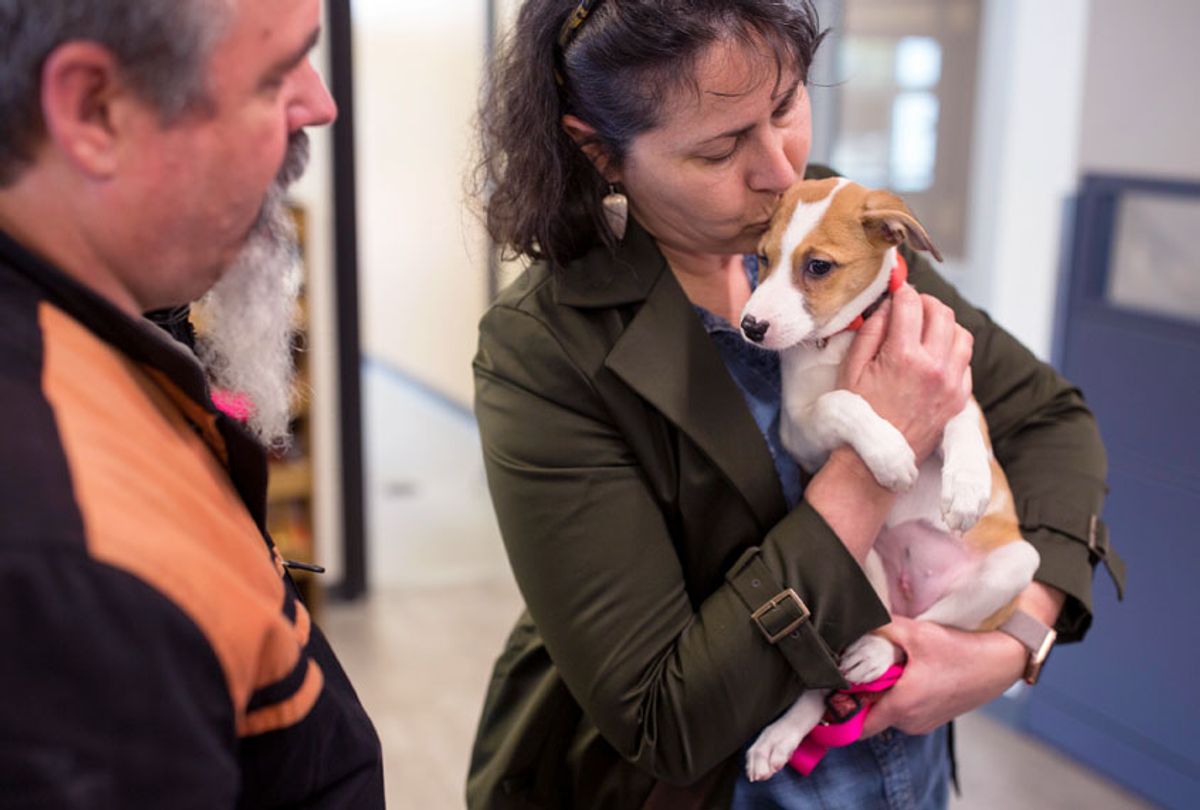I recently worked at the Veterans Administration on a research study pairing service and emotional support dogs with veterans who have post-traumatic stress disorder. The veterans often brought up how the dogs gave them a sense of purpose, and gave them a way to keep a routine. Now, in my capacity as a social work professor, I am continuing to explore the human animal bond.
Indeed, studies and observations confirm what a lot of us probably suspected: animals have a strong positive impact on humans' mental and physical health – especially during difficult times. This is particularly relevant in this moment of mass social trauma, when the pandemic has brought feelings of loneliness and isolation to millions around the country.
Merely petting or playing with a dog can reduce stress by releasing oxytocin, a natural hormone in the body; and chemicals that stabilize mood and help with happiness like serotonin and dopamine can increase. Interactions with animals lead to a decrease in blood pressure, relaxed muscle tension, and can help breathing become more regular.
With more than 36 million Americans out of work, some have lost a sense of meaning and purpose. Workers are accustomed to having a specific role in society, which cannot be filled in unemployment. Certainly, losing a daily routine is difficult; likewise, pets can help their parents keep a schedule. Pets don't know that pandemic is happening; they still wake up at the same time every day, and want to be fed at the same time. Pets help us remember that even though things are difficult right now, one can still have some kind of sense of routine and normalcy.
Family and friends posting or sending pictures of their pets may not seem like a big deal, but just seeing photos and stories of pets can increase feelings of bonding with others and give us a sense of connection. With access to the internet or a cell phone, people can gain these positive interactions without leaving their home, or getting a pet themselves.
I've been asked a number of times what will happen to a pet if their owner gets COVID-19. To mitigate potential stress, plan for the future and identify a caregiver for your pet. Create a profile for your pet that includes all relevant information in one place like habits, food preferences, medical conditions and medications taken, veterinarian contact information, and any behavioral tendencies. Also, have enough food for your pet. That doesn't mean going out and buying all of the dog or cat food, but it does mean making sure that you have a couple of extra bags laying around.
I've also heard from people who didn't have pets prior to the pandemic and are wondering if now is a good time to get one. Many of us suddenly have more free time to give love and care towards an animal. I caution people about jumping into this before considering all the pros and cons — and especially, what will happen when life starts to get back to normal. If you're not sure that pet ownership is right for you at the moment, one way you can gain benefits from pets is by fostering an animal. There's a lot of shelters that have an extra call-out for foster parents. If you do adopt, make sure to separate from the pet so they don't suffer from separation anxiety when you can't spend every moment with them.
By fostering an animal, not only are you helping that cat or dog out, but you're also able to receive all the positive benefits of being able to interact with that animal, and during these times, that's as good as owning one. I did my best not to foster 10 dogs, but I have been lucky to enjoy some additional happiness and more of a sense of purpose from fostering one adorable Husky during this pandemic.
One of the veterans I worked with told me, "I used to stay in bed until noon, but now that I have a dog, he needs me to be up at 8 o'clock, and it doesn't really matter how I'm feeling." Having a furry friend depend on you may be just the thing to help you through this pandemic.



Shares